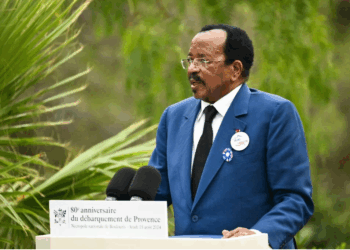South Korea’s parliament voted to impeach Prime Minister and Acting President Han Duck-soo on Friday, marking yet another leadership change in a month filled with political upheaval. This decision follows the impeachment of President Yoon Suk Yeol earlier this month, triggered by his controversial six-hour martial law order that plunged the nation into disarray.
The Latest Impeachment
In a heated parliamentary session, 192 lawmakers voted to impeach Han, surpassing the 151 votes needed in the 300-member legislature. Chaotic scenes erupted as members of the ruling People Power Party protested the decision, accusing the opposition of abusing its power. National Assembly Speaker Woo Won-shik’s declaration that only a simple majority was required to approve the motion fueled the tension.
Han, who assumed the role of acting president following Yoon’s impeachment, stated he respected the decision and pledged to step aside to avoid further confusion. Finance Minister and Deputy Prime Minister Choi Sang-mok has now taken over as acting president, adding yet another name to the list of leaders within a short span of time.
Root Causes of the Crisis
The political instability gripping South Korea has roots in a series of controversial decisions and systemic issues:
- Martial Law Decree: President Yoon’s abrupt declaration of martial law on December 3, which lasted only six hours, sparked widespread protests and was seen as an overreach of power.
- Judicial Vacancies: Han’s refusal to fill three vacant seats in the Constitutional Court became a key factor in the opposition’s push for his impeachment. These vacancies complicate the court’s ability to adjudicate impeachment cases.
- Opposition Movements: The main opposition Democratic Party has been relentless in holding government officials accountable, filing multiple impeachment motions against members of Yoon’s administration.
Implications for South Korea
The political turbulence has far-reaching consequences for South Korea:
- Domestic Governance: The frequent changes in leadership have disrupted governance, delaying critical reforms and policy decisions.
- Economic Confidence: Investors are wary of the instability, which could negatively impact the nation’s economic outlook.
- International Relations: The country’s ability to engage effectively with key global partners may be undermined by the ongoing uncertainty.
A Path Forward
The Constitutional Court now faces the daunting task of determining the fate of Yoon’s impeachment while managing other pending cases. Under South Korean law, at least six out of nine justices must approve an impeachment for it to be upheld. However, with only six justices currently seated, unanimous agreement is required.
If Yoon’s impeachment is upheld, South Korea will need to hold new presidential elections within 60 days, potentially ushering in a new era of leadership. For now, the nation’s focus remains on stabilizing its democratic institutions and addressing the systemic issues that have led to this crisis.
South Korea’s parliament voted to impeach Prime Minister and Acting President Han Duck-soo on Friday, marking yet another leadership change in a month filled with political upheaval. This decision follows the impeachment of President Yoon Suk Yeol earlier this month, triggered by his controversial six-hour martial law order that plunged the nation into disarray.
The Latest Impeachment
In a heated parliamentary session, 192 lawmakers voted to impeach Han, surpassing the 151 votes needed in the 300-member legislature. Chaotic scenes erupted as members of the ruling People Power Party protested the decision, accusing the opposition of abusing its power. National Assembly Speaker Woo Won-shik’s declaration that only a simple majority was required to approve the motion fueled the tension.
Han, who assumed the role of acting president following Yoon’s impeachment, stated he respected the decision and pledged to step aside to avoid further confusion. Finance Minister and Deputy Prime Minister Choi Sang-mok has now taken over as acting president, adding yet another name to the list of leaders within a short span of time.
Root Causes of the Crisis
The political instability gripping South Korea has roots in a series of controversial decisions and systemic issues:
- Martial Law Decree: President Yoon’s abrupt declaration of martial law on December 3, which lasted only six hours, sparked widespread protests and was seen as an overreach of power.
- Judicial Vacancies: Han’s refusal to fill three vacant seats in the Constitutional Court became a key factor in the opposition’s push for his impeachment. These vacancies complicate the court’s ability to adjudicate impeachment cases.
- Opposition Movements: The main opposition Democratic Party has been relentless in holding government officials accountable, filing multiple impeachment motions against members of Yoon’s administration.
Implications for South Korea
The political turbulence has far-reaching consequences for South Korea:
- Domestic Governance: The frequent changes in leadership have disrupted governance, delaying critical reforms and policy decisions.
- Economic Confidence: Investors are wary of the instability, which could negatively impact the nation’s economic outlook.
- International Relations: The country’s ability to engage effectively with key global partners may be undermined by the ongoing uncertainty.
A Path Forward
The Constitutional Court now faces the daunting task of determining the fate of Yoon’s impeachment while managing other pending cases. Under South Korean law, at least six out of nine justices must approve an impeachment for it to be upheld. However, with only six justices currently seated, unanimous agreement is required.
If Yoon’s impeachment is upheld, South Korea will need to hold new presidential elections within 60 days, potentially ushering in a new era of leadership. For now, the nation’s focus remains on stabilizing its democratic institutions and addressing the systemic issues that have led to this crisis.









